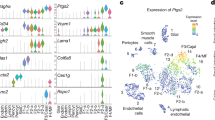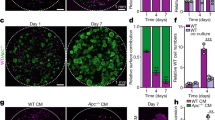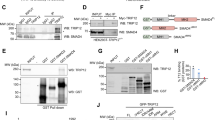Abstract
SMAD4 (MAD homologue 4 (Drosophila)), also known as DPC4 (deleted in pancreatic cancer), is a tumour suppressor gene that encodes a central mediator of transforming growth factor-β signalling1,2,3,4. Germline mutations in SMAD4 are found in over 50% of patients with familial juvenile polyposis, an autosomal dominant disorder characterized by predisposition to hamartomatous polyps and gastrointestinal cancer5,6. Dense inflammatory cell infiltrates underlay grossly normal appearing, non-polypoid colonic and gastric mucosa of patients with familial juvenile polyposis7. This prominent stromal component suggests that loss of SMAD4-dependent signalling in cells within the epithelial microenvironment has an important role in the evolution of intestinal tumorigenesis in this syndrome. Here we show that selective loss of Smad4-dependent signalling in T cells leads to spontaneous epithelial cancers throughout the gastrointestinal tract in mice, whereas epithelial-specific deletion of the Smad4 gene does not. Tumours arising within the colon, rectum, duodenum, stomach and oral cavity are stroma-rich with dense plasma cell infiltrates. Smad4-/- T cells produce abundant TH2-type cytokines including interleukin (IL)-5, IL-6 and IL-13, known mediators of plasma cell and stromal expansion. The results support the concept that cancer, as an outcome, reflects the loss of the normal communication between the cellular constituents of a given organ8, and indicate that Smad4-deficient T cells ultimately send the wrong message to their stromal and epithelial neighbours.
This is a preview of subscription content, access via your institution
Access options
Subscribe to this journal
Receive 51 print issues and online access
$199.00 per year
only $3.90 per issue
Buy this article
- Purchase on Springer Link
- Instant access to full article PDF
Prices may be subject to local taxes which are calculated during checkout




Similar content being viewed by others
References
Heldin, C. H., Miyazono, K. & ten Dijke, P. TGF-β signalling from cell membrane to nucleus through SMAD proteins. Nature 390, 465–471 (1997)
Hahn, S. A. et al. DPC4, a candidate tumor suppressor gene at human chromosome 18q21.1. Science 271, 350–353 (1996)
Massague, J. TGF-β signal transduction. Annu. Rev. Biochem. 67, 753–791 (1998)
Miyaki, M. & Kuroki, T. Role of Smad4 (DPC4) inactivation in human cancer. Biochem. Biophys. Res. Commun. 306, 799–804 (2003)
Howe, J. R. et al. Common deletion of SMAD4 in juvenile polyposis is a mutational hotspot. Am. J. Hum. Genet. 70, 1357–1362 (2002)
Howe, J. R. et al. Mutations in the SMAD4/DPC4 gene in juvenile polyposis. Science 280, 1086–1088 (1998)
Subramony, C., Scott-Conner, C. E., Skelton, D. & Hall, T. J. Familial juvenile polyposis. Study of a kindred: evolution of polyps and relationship to gastrointestinal carcinoma. Am. J. Clin. Pathol. 102, 91–97 (1994)
Bissell, M. J. & Labarge, M. A. Context, tissue plasticity, and cancer: are tumor stem cells also regulated by the microenvironment? Cancer Cell 7, 17–23 (2005)
Yang, X., Li, C., Herrera, P. L. & Deng, C. X. Generation of Smad4/Dpc4 conditional knockout mice. Genesis 32, 80–81 (2002)
Orban, P. C., Chui, D. & Marth, J. D. Tissue- and site-specific DNA recombination in transgenic mice. Proc. Natl Acad. Sci. USA 89, 6861–6865 (1992)
Sawada, S., Scarborough, J. D., Killeen, N. & Littman, D. R. A lineage-specific transcriptional silencer regulates CD4 gene expression during T lymphocyte development. Cell 77, 917–929 (1994)
Wagner, K. U. et al. Cre-mediated gene deletion in the mammary gland. Nucleic Acids Res. 25, 4323–4330 (1997)
Yan, C., Costa, R. H., Darnell, J. E. Jr, Chen, J. D. & Van Dyke, T. A. Distinct positive and negative elements control the limited hepatocyte and choroid plexus expression of transthyretin in transgenic mice. EMBO J. 9, 869–878 (1990)
Letterio, J. J. & Roberts, A. B. Regulation of immune responses by TGF-β. Annu. Rev. Immunol. 16, 137–161 (1998)
Gorelik, L. & Flavell, R. A. Transforming growth factor-β in T-cell biology. Nature Rev. Immunol. 2, 46–53 (2002)
Wynn, T. A. IL-13 effector functions. Annu. Rev. Immunol. 21, 425–456 (2003)
Yang, L. et al. Targeted disruption of Smad4 in mouse epidermis results in failure of hair follicle cycling and formation of skin tumors. Cancer Res. 65, 8671–8678 (2005)
Li, W. et al. Squamous cell carcinoma and mammary abscess formation through squamous metaplasia in Smad4/Dpc4 conditional knockout mice. Development 130, 6143–6153 (2003)
Tsuchida, K., Zhu, Y., Siva, S., Dunn, S. R. & Sharma, K. Role of Smad4 on TGF-β-induced extracellular matrix stimulation in mesangial cells. Kidney Int. 63, 2000–2009 (2003)
Markowitz, S. et al. Inactivation of the type II TGF-β receptor in colon cancer cells with microsatellite instability. Science 268, 1336–1338 (1995)
Bhowmick, N. A., Neilson, E. G. & Moses, H. L. Stromal fibroblasts in cancer initiation and progression. Nature 432, 332–337 (2004)
Bhowmick, N. A. et al. TGF-β signalling in fibroblasts modulates the oncogenic potential of adjacent epithelia. Science 303, 848–851 (2004)
Kinzler, K. W. & Vogelstein, B. Landscaping the cancer terrain. Science 280, 1036–1037 (1998)
Woodford-Richens, K. et al. Allelic loss at SMAD4 in polyps from juvenile polyposis patients and use of fluorescence in situ hybridization to demonstrate clonal origin of the epithelium. Cancer Res. 60, 2477–2482 (2000)
Becker, C. et al. IL-6 signalling promotes tumor growth in colorectal cancer. Cell Cycle 4, 217–220 (2005)
Hodge, D. R., Hurt, E. M. & Farrar, W. L. The role of IL-6 and STAT3 in inflammation and cancer. Eur. J. Cancer 41, 2502–2512 (2005)
Corvinus, F. M. et al. Persistent STAT3 activation in colon cancer is associated with enhanced cell proliferation and tumor growth. Neoplasia 7, 545–555 (2005)
Jenkins, B. J. et al. Hyperactivation of Stat3 in gp130 mutant mice promotes gastric hyperproliferation and desensitizes TGF-β signaling. Nature Med. 11, 845–852 (2005)
Becker, C. et al. TGF-β suppresses tumor progression in colon cancer by inhibition of IL-6 trans-signaling. Immunity 21, 491–501 (2004)
Acknowledgements
The authors thank A. B. Roberts for her thoughtful reading of this manuscript and considerate support of this research. Author Contributions B.-G.K. and J.J.L. are responsible for developing the hypothesis, planning and executing experiments, including analysis of models with T-cell-specific deletion of Smad4, and for preparation of the manuscript. C.L., W.Q., X.-Y.F. and C.D. are responsible for the development of models with epithelial-specific deletion of the Smad4 gene. S.-J.K. and S.H. developed and analysed the ITF-dnS4 transgenic model. M.M. established mouse colonies with T-cell-restricted deletion of Smad4. E.M. and M.P. provided immunohistochemical analysis of plasma cell infiltrates. M.A. provided analysis of histopathology and B.K. developed immunohistochemical procedures for Smad4. L.W. contributed in the preparation of the manuscript and in the evaluation of the data.
Author information
Authors and Affiliations
Corresponding author
Ethics declarations
Competing interests
Reprints and permissions information is available at npg.nature.com/reprintsandpermissions. The authors declare no competing financial interests.
Supplementary information
Supplementary Notes
This file contains Supplementary Methods and Supplementary Figure Legends. (DOC 34 kb)
Supplementary Figure 1
Smad4-dependent signaling is in stroma cells is key to maintaining intestinal homeostasis. (PDF 114 kb)
Supplementary Figures 2 and 3
Supplementary Figure 2 details diffuse plasma cell infiltration of intestines in mice with T cell-restricted deletion of the SMAD4 gene. Supplementary Figure 3 details epithelial-specific expression of a dominant-negative acting Smad4 transgene is not associated with spontaneous tumorigenesis. (PDF 105 kb)
Supplementary Figure 4
SMAD4+/co;Lck-cre mice develop plasma cell and epithelial cell hyperplasia. (PDF 116 kb)
Rights and permissions
About this article
Cite this article
Kim, BG., Li, C., Qiao, W. et al. Smad4 signalling in T cells is required for suppression of gastrointestinal cancer. Nature 441, 1015–1019 (2006). https://doi.org/10.1038/nature04846
Received:
Accepted:
Issue Date:
DOI: https://doi.org/10.1038/nature04846
This article is cited by
-
Mesenchymal stem cells can prevent or promote the progression of colon cancer based on their timing of administration
Journal of Translational Medicine (2023)
-
Immunosuppressive niche engineering at the onset of human colorectal cancer
Nature Communications (2022)
-
Interplay between transforming growth factor-β and Nur77 in dual regulations of inhibitor of differentiation 1 for colonic tumorigenesis
Nature Communications (2021)
-
Loss of Smad4 promotes aggressive lung cancer metastasis by de-repression of PAK3 via miRNA regulation
Nature Communications (2021)
-
An FBXW7-ZEB2 axis links EMT and tumour microenvironment to promote colorectal cancer stem cells and chemoresistance
Oncogenesis (2019)
Comments
By submitting a comment you agree to abide by our Terms and Community Guidelines. If you find something abusive or that does not comply with our terms or guidelines please flag it as inappropriate.



